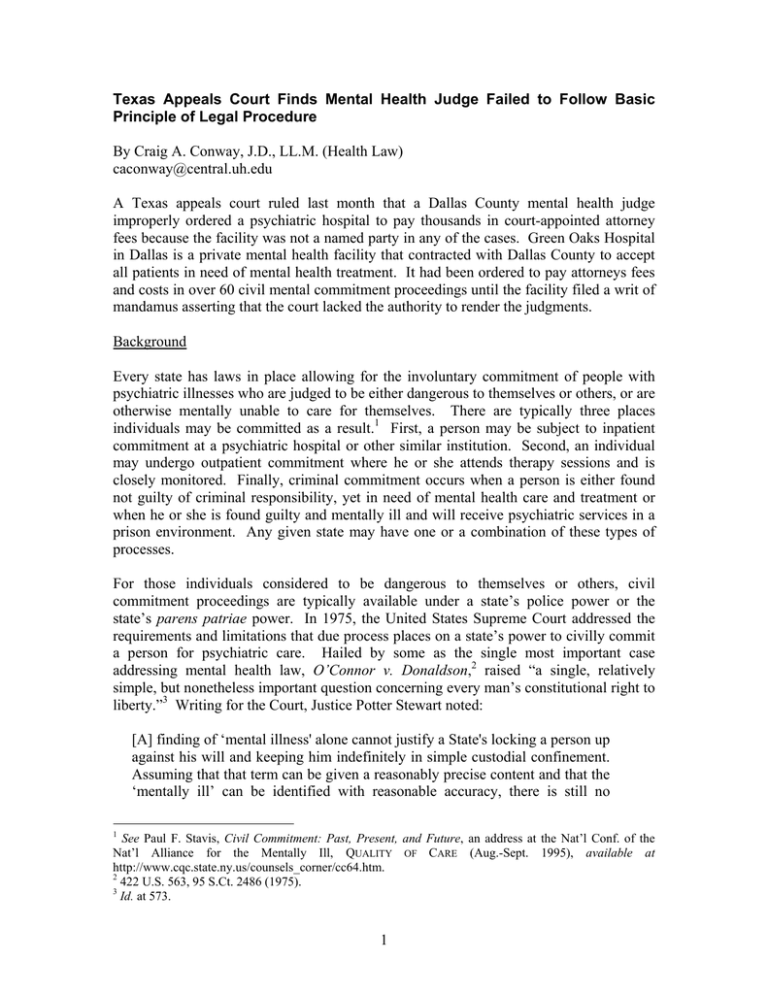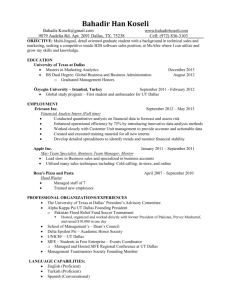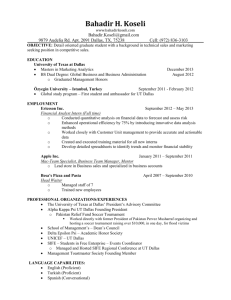By Craig A. Conway, J.D., LL.M. (Health Law)
advertisement

Texas Appeals Court Finds Mental Health Judge Failed to Follow Basic Principle of Legal Procedure By Craig A. Conway, J.D., LL.M. (Health Law) caconway@central.uh.edu A Texas appeals court ruled last month that a Dallas County mental health judge improperly ordered a psychiatric hospital to pay thousands in court-appointed attorney fees because the facility was not a named party in any of the cases. Green Oaks Hospital in Dallas is a private mental health facility that contracted with Dallas County to accept all patients in need of mental health treatment. It had been ordered to pay attorneys fees and costs in over 60 civil mental commitment proceedings until the facility filed a writ of mandamus asserting that the court lacked the authority to render the judgments. Background Every state has laws in place allowing for the involuntary commitment of people with psychiatric illnesses who are judged to be either dangerous to themselves or others, or are otherwise mentally unable to care for themselves. There are typically three places individuals may be committed as a result.1 First, a person may be subject to inpatient commitment at a psychiatric hospital or other similar institution. Second, an individual may undergo outpatient commitment where he or she attends therapy sessions and is closely monitored. Finally, criminal commitment occurs when a person is either found not guilty of criminal responsibility, yet in need of mental health care and treatment or when he or she is found guilty and mentally ill and will receive psychiatric services in a prison environment. Any given state may have one or a combination of these types of processes. For those individuals considered to be dangerous to themselves or others, civil commitment proceedings are typically available under a state’s police power or the state’s parens patriae power. In 1975, the United States Supreme Court addressed the requirements and limitations that due process places on a state’s power to civilly commit a person for psychiatric care. Hailed by some as the single most important case addressing mental health law, O’Connor v. Donaldson,2 raised “a single, relatively simple, but nonetheless important question concerning every man’s constitutional right to liberty.”3 Writing for the Court, Justice Potter Stewart noted: [A] finding of ‘mental illness' alone cannot justify a State's locking a person up against his will and keeping him indefinitely in simple custodial confinement. Assuming that that term can be given a reasonably precise content and that the ‘mentally ill’ can be identified with reasonable accuracy, there is still no 1 See Paul F. Stavis, Civil Commitment: Past, Present, and Future, an address at the Nat’l Conf. of the Nat’l Alliance for the Mentally Ill, QUALITY OF CARE (Aug.-Sept. 1995), available at http://www.cqc.state.ny.us/counsels_corner/cc64.htm. 2 422 U.S. 563, 95 S.Ct. 2486 (1975). 3 Id. at 573. 1 constitutional basis for confining such persons involuntarily if they are dangerous to no one and can live safely in freedom. May the State confine the mentally ill merely to ensure them a living standard superior to that they enjoy in the private community? That the State has a proper interest in providing care and assistance to the unfortunate goes without saying. But the mere presence of mental illness does not disqualify a person from preferring his home to the comforts of an institution….In short, a State cannot constitutionally confine without more a nondangerous individual who is capable of surviving safely in freedom by himself or with the help of willing and responsible family members or friends.4 However, should a state court find that an individual is either dangerous to himself or others, the person is committed to a facility that provides mental health treatment. To initiate and conduct the required legal proceeding to make such a determination, there are costs associated with filing the appropriate paperwork, fees for attorneys participating in the hearing, and other administrative costs that must be paid. In Texas, the law concerning payment of costs to initiate a civil commitment hearing states, in part: (a) (b) The costs for a hearing or proceeding under this subtitle shall be paid by: (1) the county that initiates emergency detention procedures…; or (2) if no emergency detention procedures are initiated, the county that accepts an application for court-ordered mental health services, issues an order for protective custody, or issues an order for temporary mental health services. The county responsible for the costs of a hearing or proceeding under Subsection (a) shall pay the costs of all subsequent hearings or proceedings for that person under this subtitle until the person is discharged from mental health services. The costs shall be billed by the clerk of the court conducting the hearings.5 Under the law, costs include attorneys’ fees, physician examination fees, compensation for court-appointed personnel, and transportation expenses.6 A county is also entitled to reimbursement from either the patient or an individual’s estate for costs paid.7 Currently, there are ten state mental health facilities in Texas, also called state hospitals, which provide mental health treatment for those involuntarily committed.8 The hospitals function as a system – allowing for patients to be transferred or admissions diverted from 4 Id. at 575-76. TEX. HEALTH & SAFETY CODE ANN. § 571.018 (Vernon 2009). 6 Id. at § 571.018(c). 7 Id. at § 571.018(d). 8 Tex. Dep’t of State Health Servs., State Mental Health Facilities and Commitments, available at http://www.dshs.state.tx.us/council/agendas/030305/4dii.pdf (last updated Apr. 25, 2005). State hospitals are located in Austin, Big Spring, El Paso, Harlingen, Kerrville, Rusk, San Antonio, Terrell, Vernon/Wichita Falls, and Waco. 5 2 one to another for various reasons. According to the Texas Department of State Health Services (DSHS), the state hospitals have, over the years, become acute care treatment facilities rather than long-term care facilities; the average length of stay being around 26 days.9 One of the major issues within the state hospital system, as well as nationwide, is a significant increase in the number of commitments and a reduction in funded beds, resulting in over-capacity.10 Due to such over-crowding, patients often can wait days or months after commitment before actually receiving treatment within a facility. Once admitted, patients are often discharged too soon in order to “make room” for new patients. As a result, patients often do not receive the treatment they need, stop taking their medications, and re-enter the process all over again. Private mental health facilities play an integral role in the current mental health treatment system. In cities or areas where there is no state hospital or in over-capacity situations, a private facility can offer services to assist in treating those involuntarily committed. In re Green Oaks Hospital Subsidiary Green Oaks is a mental health facility that provides inpatient psychiatric care and treatment to patients involuntarily committed.11 The facility contracted with Dallas County to accept all patients that local law enforcement and other officials believed were seriously mentally ill and may pose a danger to themselves or others.12 Once an individual is brought to the facility, he or she is evaluated. If it is determined that the individual suffers from a mental illness and there is substantial risk of serious harm to himself or others, the State commences involuntary commitment proceedings.13 The Dallas County District Attorney prosecutes the matter and, often, a court-appointed attorney represents the individual. The judge makes the determination of whether commitment is necessary and also designates a facility to which the individual may be committed.14 Beginning in 2007, newly-elected Dallas County probate and mental health Judge Michael Miller discontinued the practice of waiving the fees associated with involuntarily committing indigent individuals to Green Oaks – the only facility available to handle such patients.15 During such proceedings, Judge Miller had not been convinced that many patients before the court were actually indigent. Additionally, he relied more heavily on appointed private attorneys than the public defender assigned to the court and subsequently billed 9 Id. Id. 11 In re Green Oaks Hosp. Subsidiary, 2009 WL 2857505 (Tex.App.—Dallas). 12 Id. at *1. 13 Id. 14 Id. 15 Kevin Krause, Green Oaks May Refuse Dallas County Psychiatric Patients, DALLAS MORN. NEWS, May 27, 2009, http://www.dallasnews.com/sharedcontent/dws/news/localnews/stories/052709dnmetattorneyfees .43e20da.html. 10 3 Green Oaks for the costs.16 As a result, Green Oaks filed a petition to block the court’s orders for it to pay. On September 8, 2009, an appeals court in Dallas held that Judge Miller had abused his discretion in requiring Green Oaks to pay such costs in the 61 judgments at issue because the facility was not a party to any of the cases. In its opinion, the court began by reviewing basic concepts of civil procedure. It noted: [T]o issue a binding judgment against a party, a court must possess personal jurisdiction over that party. Such personal jurisdiction is invoked by the party’s appearance before the court, or by lawful service of process upon the party. Without personal jurisdiction over a party, the trial court has no jurisdiction to enter a judgment against it. More specifically, a trial court cannot order a nonparty to pay costs.17 In all of the involuntary commitment cases at issue, Green Oaks was not made a party to the proceedings.18 Consequently, the probate court, and thus Judge Miller, had no jurisdiction over the facility and lacked authority to render any judgment against it.19 Dallas County, and the private attorneys who were awarded fees, argued that Green Oaks should pay based upon various portions of state law. However, the appellate court said liability, by itself, was not the issue. [W]hether any such liability does or does not exist is not the issue. The controlling issue is whether the trial court can render judgment imposing such liability against any entity over which it has no jurisdiction. It cannot.20 One provision of the Texas Health and Safety Code relied upon by Dallas County and the private attorneys was section 571.018(h) which prohibits the State or County from paying costs for commitments to private facilities.21 The provision states: [T]he state or a county may not pay any costs for a patient committed to a private mental hospital unless: (1) a public facility is not available; and (2) the commissioners court of the county authorizes the payment, if appropriate.22 16 Kevin Krause, Court Says Dallas County Mental Health Judge is Wrong, DALLAS MORN. NEWS, Sept. 12, 2009, http://www.dallasnews.com/sharedcontent/dws/news/localnews/stories/DN-dalmental_12met. ART0.State.Edition1.4c18720.html. 17 In re Green Oaks Hosp. Subsidiary, 2009 WL 2857505 at *1 (Tex.App.—Dallas). 18 Id. at *2. 19 Id. 20 Id. 21 TEX. HEALTH & SAFETY CODE ANN. § 571.018(h) (Vernon 2009). 22 Id. 4 The gist of this argument, the appellate court said, was that since Dallas County could not be required to pay the costs, Green Oaks could. However, the court said, “[r]egardless of what section 571.018 says about the County’s obligation to pay, it does not speak to a private hospital’s liability for such costs.”23 The court did not address the potential catch22 in the statute that arguably could allow a county to avoid liability for payment by simply not approving the necessary funds. The remainder of the arguments presented by Dallas County and the attorneys were discounted and the appellate court voided the portion of the 61 judgments that required Green Oaks to pay between $75 to $160 in attorneys fees and any other “court costs.”24 Conclusion Throughout the Dallas County involuntary commitment debacle, Green Oaks had threatened to stop accepting patients in need of mental health treatment if it was forced to pay the court costs.25 That prompted county commissioners in June to agree to pay the fees for mentally ill patients who qualified as indigent based on standards used by Parkland Memorial Hospital.26 It is unclear how Judge Miller came to the conclusion that he had the authority to bypass a basic concept of legal procedure and order a nonparty to pay costs. Hopefully the issue surrounding who will pay can be quickly resolved so that those in need of mental health treatment are able to receive it. Health Law Perspectives (October 2009) Health Law & Policy Institute University of Houston Law Center http://www.law.uh.edu/healthlaw/perspectives/homepage.asp 23 Id. Id. at *3. 25 Krause, supra note 16. 26 Id. 24 5





